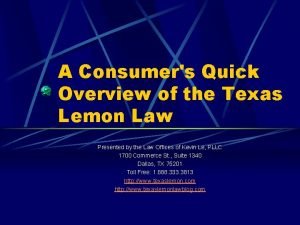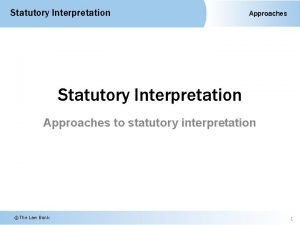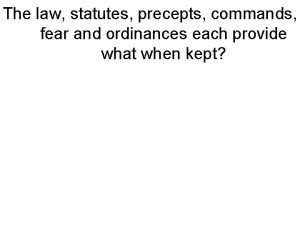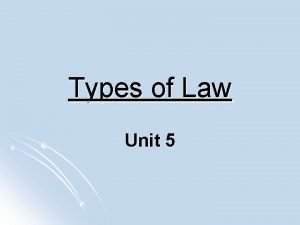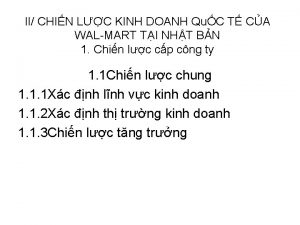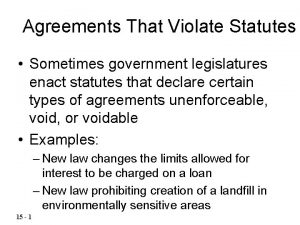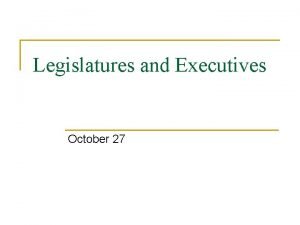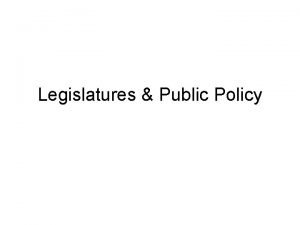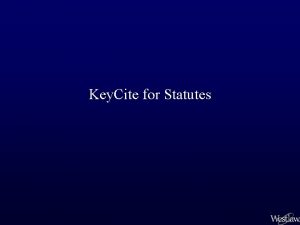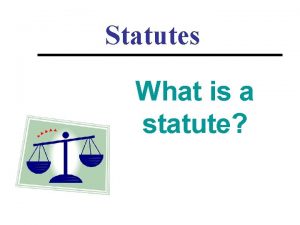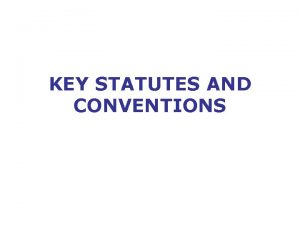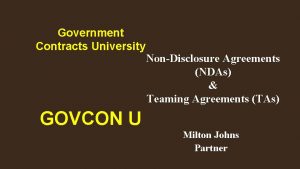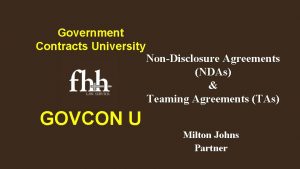Agreements That Violate Statutes Sometimes government legislatures enact












- Slides: 12

Agreements That Violate Statutes • Sometimes government legislatures enact statutes that declare certain types of agreements unenforceable, void, or voidable • Examples: – New law changes the limits allowed for interest to be charged on a loan – New law prohibiting creation of a landfill in environmentally sensitive areas 15 - 1

Agreements That Violate Public Policy • Agreements that violate public policy include: – Agreements to commit a crime – Agreements promoting an illegal purpose – Agreement to perform an act for which the person is not properly licensed – Agreements in restraint of competition 15 - 2

Licensing Statutes • A common regulatory statute requires a person to obtain a license, permit, or registration before engaging in a certain business or profession • If the purpose of the statute is to protect the public against dishonest or incompetent practitioners, then an agreement is unenforceable if an 15 - 3 unlicensed person agrees to do an

Riggs v. Woman to Woman, P. C. • Facts & Procedural History: – Riggs joined defendant medical practice after assurances that the medical practice was a licensed professional corporation • Employment agreement contained a covenant not to compete – Riggs discovered that defendant was not a licensed professional corporation 15 - 4

Riggs v. Woman to Woman, P. C. • Issue & Court’s Discussion: – Was the employment agreement void because defendant was not licensed? – Defendant properly attempted to obtain the license and when it determined it was not properly licensed, it remedied the situation and obtained the license • Had operated as a de facto corporation 15 - 5

Riggs v. Woman to Woman, P. C. • Court’s Analysis & Ruling: – Purpose of the licensing act is permissive – to allow a medical practice the protections of a corporation; not to protect the public – Since defendant did 15 - 6 nothing illegal, the

Agreements in Restraint of Competition • If the sole purpose of an agreement is to restrain competition, it violates public policy and is illegal • If the restraint on competition was part of an otherwise legal contract, the result may be different because the parties may have a legitimate interest to be protected by the 15 - 7 restriction on competition

Non-competition clauses • Courts enforce a non-competition clause if: – It serves a legitimate business purpose, – The restriction is reasonable in time, geographic area, and scope – It does not impose an undue hardship • Example: Jay’s Custom Stringing, v. Yu in which the clause was 15 -Inc. 8

Unconscionable Agreements • Under the doctrine of unconscionability, courts refuse to grant the equitable remedy of specific performance for breach of contract if the contract is oppressively unfair • Unconscionability means the absence of meaningful choice together with terms unreasonably 15 - 9 advantageous to one of the parties

Unconscionable Agreements • UCC 2– 302 gives courts power to refuse to enforce all or part of a contract for the sale of goods or to modify such a contract if it is found to be unconscionable • Example: Circuit City Stores, Inc. v. Mantor – Company pressured and threatened employee to sign an agreement to arbitrate 15 - 10

Contracts of Adhesion • A contract of adhesion is a contract, usually on a standardized form, offered by a party who is in a superior bargaining position on a “take-it-or-leaveit” basis 15 • - 11 Courts will enforce

Exculpatory Clauses • An exculpatory clause (a release or liability waiver) in a contract attempts to protect one party from liability for damages • Exculpatory clauses are perhaps suspect on public policy grounds, but courts do not want to interfere with the agreement if it does not threaten 15 - 12 public health or safety
 Car lemon law texas
Car lemon law texas Strict interpretation of taxing statutes
Strict interpretation of taxing statutes Statutory interpretation
Statutory interpretation Statutes and precepts
Statutes and precepts Florida statute 252
Florida statute 252 Statute law examples
Statute law examples God when you choose to leave mountains unmovable
God when you choose to leave mountains unmovable Sometimes sweet
Sometimes sweet Sometimes cold sometimes hot
Sometimes cold sometimes hot They say it only takes a little faith
They say it only takes a little faith Ngoại tâm thu thất chùm đôi
Ngoại tâm thu thất chùm đôi Tìm vết của đường thẳng
Tìm vết của đường thẳng Walmart thất bại ở nhật
Walmart thất bại ở nhật
